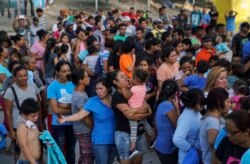A 9th U.S. Circuit Court of Appeals panel voted unanimously Friday to suspend an order it issued earlier in the day to block a central pillar of the Trump administration’s policy requiring asylum-seekers to wait in Mexico while their cases wind through U.S. courts.
The three-judge panel told the government to file written arguments by the end of Monday and for the plaintiffs to respond by the end of Tuesday.
The Justice Department said at least 25,000 asylum-seekers subject to the policy are waiting in Mexico and expressed “massive and irreparable national-security of public-safety concerns.”
Government attorneys said immigration lawyers had begun demanding that asylum-seekers be allowed into the United States, with one insisting that 1,000 people be allowed to enter at one location.
“The court’s reinstatement of the injunction causes the United States public and the government significant and irreparable harms — to border security, public safety, public health, and diplomatic relations,” Justice Department attorneys wrote.
Customs and Border Protection had begun to stop processing people under the policy.
Setback for ACLU
ACLU attorney Judy Rabinovitz called the suspension of Friday’s order “a temporary step.”
“We will continue working to permanently end this unspeakably cruel policy,” she said.
The government’s setback earlier Friday from the three-judge panel of the 9th U.S. Circuit Court of Appeals may prove temporary if President Donald Trump’s administration appeals to the U.S. Supreme Court, which has consistently sided with Trump on immigration and border security policies. Chad Wolf, the acting Homeland Security secretary, said he was working with the Justice Department to “expeditiously appeal this inexplicable decision.”
The “Remain in Mexico” policy, known officially as “Migrant Protection Protocols,” took effect in January 2019 in San Diego and gradually spread across the southern border. About 60,000 people have been sent back to wait for hearings, and officials believe it is a big reason why illegal border crossings plummeted about 80% from a 13-year high in May.
Christopher Landau, the U.S. ambassador to Mexico, said in a court filing that halting the policy creates “substantial risk of immediate chaos on the border.”
The ambassador said the policy is critical to deterring “uncontrolled of third-country migrants through Mexico to the United States” and that halting it would encourage more asylum-seekers to come and “obliterate the substantial progress that both countries have made over the last year.”
Reaction to the decision blocking the policy was swift among immigration lawyers and advocates who have spent months fighting with the administration over a program they see as a humanitarian disaster, subjecting hundreds of migrants to violence, kidnapping and extortion in dangerous Mexican border cities. Hundreds more have been living in squalid encampments just across the border, as they wait for their next court date.
Asylum ban
The asylum ban on anyone who crosses the border illegally from Mexico also drew pointed questions from the judges during arguments. They asked whether the policy violated U.S. law that says it doesn't matter how people enter the country.
The U.S. Supreme Court declined to lift a ruling blocking the ban following an extraordinary spat last year between Trump and Chief Justice John Roberts.
The president denounced the judge who ruled against the ban as an “Obama judge.” Roberts said there was no such thing in a strongly worded statement defending judicial independence. Trump stood behind his comments.
Judge William Fletcher, writing the majority, sided with the American Civil Liberties Union and other advocacy groups who argued the policy violates international treaty obligations against sending people back to a country where they are likely to be persecuted or tortured on the grounds of race, religion, ethnicity, political beliefs or membership in a particular social group.
Fletcher agreed the government set the bar too high for asylum-seekers to persuade officers that they should be exempt from the policy and didn’t provide enough time for them to prepare for interviews or consult lawyers. The judges said the government also erred by requiring asylum-seekers to express fear of returning to Mexico to be considered for an exemption, instead of asking them unprompted.
Fletcher quoted at length asylum-seekers who reported being assaulted and victimized in Mexico, saying it was “enough — indeed, far more than enough” to undercut the government’s arguments.
Fletcher was joined by Judge Richard Paez, who were both appointed to the bench by President Bill Clinton. Judge Ferdinand Fernandez, an appointee of President George H.W. Bush, dissented.
Another policy on hold
The appeals court in San Francisco also decided to keep another major Trump policy on hold, one that denies asylum to anyone who enters the U.S. illegally from Mexico.
The Supreme Court, however, has allowed Trump to divert Defense Department money to border wall construction, backed rules disqualifying more people from green cards if they use government benefits and upheld a travel ban affecting several Muslim-majority countries.






